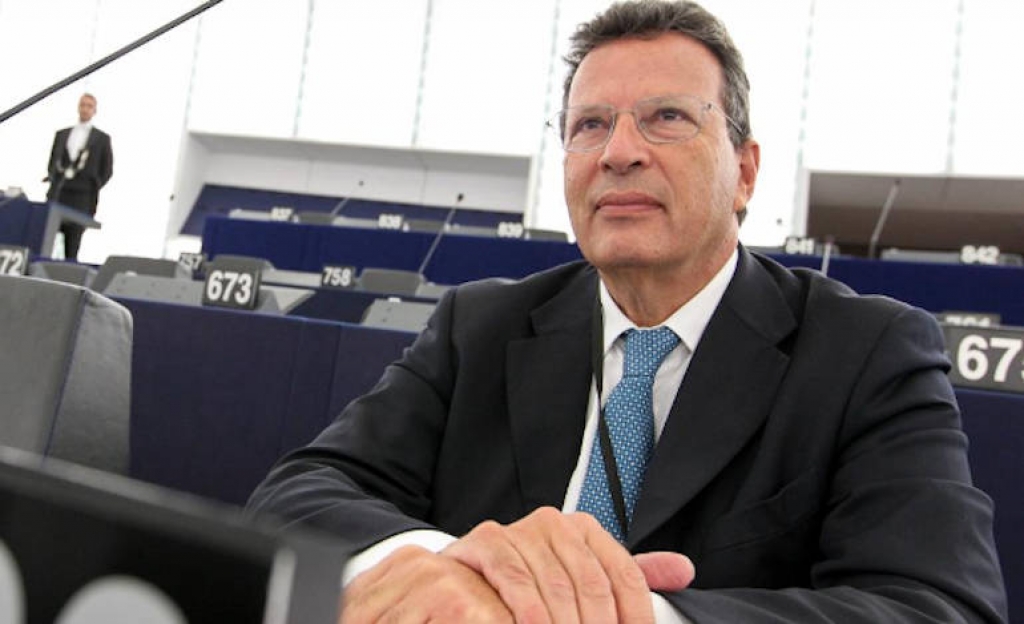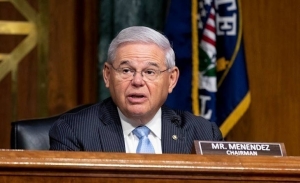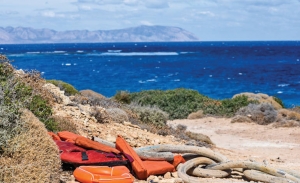
Επιστολή Κύρτσου στους 704 ευρωβουλευτές για το πραγματικό περιεχόμενο της πολιτικής Μητσοτάκη
Επιστολή στους 704 ευρωβουλευτές για το πραγματικό περιεχόμενο της πολιτικής Μητσοτάκη έστειλε ο ευρωβουλευτής, Γιώργος Κύρτσος.
Ακολουθει το ακριβές κείμενο στα αγγλικά ενώ είχε προηγηθεί η αποστολή της παρέμβασης του στην Ολομέλεια του Ευρωπαϊκού Κοινοβουλίου.
Greece: the economic, social and political situation
The economy
1. Record annual inflation
According to official statistics (Eurostat) annual inflation in Greece reached a record 12% in June. This is above the EU average (8,6%) and is the worst performance among Southern European Eurozone countries.
|
Malta |
6,1%
|
|
France |
6,5%
|
|
Italy |
8,5%
|
|
Portugal |
9%
|
|
Cyprus |
9,1%
|
|
Spain |
10%
|
|
Greece |
12%
|
Record annual inflation is due to the international crisis as well to the government’s policies and structural problems of the Greek economy.
The government was slow to react to price increases that spiked in autumn 2021. It even presented in December 2021 the annual state budget of the year 2022 based on the prediction of an annual inflation of 0,8%.
2. Widening trade deficit
During the first four months of 2022 Greece’s trade deficit increased by 4,7bn or 71,6% to reach 11,3bn euros.
This is due to more expensive imports of gas and oil and the loss of competitiveness due to higher inflation than the Eurozone average.
Excluding oil products, derivatives and natural gas the trade deficit increased by 2,5bn or 46,8%.
3. The return of the “twin deficit”
Due to COVID-19, the energy crisis and the weakening of its’ international competitiveness, Greece returned to the so called twin deficit.
In 2020, its’ current account deficit was multiplied by four and reached 6,7% of GDP. In 2021, it was in the range of 6% of GDP.
At the same time, the deficit in the budget of the general government reached 10,2% of GDP in 2020 and was reduced to 7,4% of GDP in 2021.
Things look better for 2022 since tourist receipts are increasing and the support to the economy for coping with the negative effects of the pandemic will be reduced.
A feature of the greek economy during the past 12 months is the big increase in consumer taxes receipts due to the application of high VAT rates in a high inflation environment. This is the way that the government increases tax receipts and controls, to a certain extent, the budget deficit. The Bank of Greece insists on the need to control expenditure in order to avoid greater fiscal and economic imbalances.
4. The natural gas trap
Due to the decisions taken by the Mitsotakis’ government, Greece depends on natural gas in its electricity production. Natural gas is responsible for 40-55% of electricity production and this results in very high wholesale electricity prices.
This explains the fact that for most of the past year Greece had one of the three highest wholesale prices in EU-27.
This penalizes industry, small and medium enterprises and squeezes the income of most households.
The government has been criticized for its close ties with major domestic investors that have invested in energy production based on natural gas.
While Germany has already increased its electricity production based on coal to more than 30% of the total production, Greece keeps the contribution of coal (lignite) to electricity production to 8%-14% of the total production despite the abundant reserves of lignite in Greece.
Many analysts and politicians insist that Greece should reduce its dependence on natural gas, increase for the next few years the use of lignite in electricity production and move faster towards developing renewable energy. The Greek Consumer Ombudsman has openly stated that the energy market is organized in a way that penalizes consumers and the president of the Regulatory Authority for Energy, emphasises that the Greek Competition Authority should intervene against the companies that control the energy sector.
5. Financing Putin’s war
Greece covers 40-45% of its natural gas needs from Russia and it, also, imports Russian oil.
According to official figures (ELSTAT), Greece spends more on Russian oil and natural gas than in 2021 and the period preceding the Russian invasion in Ukraine.
During the first four months of 2022 Greece’s imports from Russia - mainly oil and natural gas - more than doubled to 2,8bn euros, relative to the same period of last year. At the same time, Greece’s exports to Russia were further reduced by 25% to just 42 million euros. This is a peculiar way of financing Putin’s war without any commercial or tourist benefits.
6. Towards a record tourist season
The tourist industry expects a very good tourist season with receipts of at least 18bn euros and a reasonable chance of surpassing the record 19bn euros of 2019.
In case that the tourist season goes as well as projected, tax receipts will be sustained at a very high level and the dynamics of the current account deficit will be checked, at least until October.
7. The ECB’s role
The Greek economy is still considered the weakest link of the Eurozone. In turbulent times the borrowing cost of the over-indebted Greek state increases.
Interest rates on 10-year bonds of the Greek state reached 4,7% before the intervention of president Lagarde and the ECB in order to avoid fragmentation in the Eurozone. Since then interest rates on 10-year bonds of the Greek state are around 3,5%, proving the effectiveness of the ECB’s intervention.
Nevertheless, rising interest rates create additional problems to the functioning of the private sector of the greek economy and could, under certain circumstances, lead to a new increase to the greatly reduced NPLs.
According to the Bank of Greece official statistics, NPLs have been reduced by more than 90bn euros relative to March 2016, when they reached their highest point, but still correspond to 12,1% of total loans, whereas the European average is 2%.
8. The Bank of Greece’s projections
According to the latest projections of the Bank of Greece, the greek economy will grow by 3,2% in 2022. The April projection was more optimistic - GDP increase of 3,8% in 2022 - but the rising inflation could, according to the analysis of the experts of the Bank of Greece, reduce even further the rate of development of the greek economy.
The Bank of Greece projects annual inflation 7,6% in 2022 that will be reduced in 2023 and 2024.
This is the basic scenario. The negative scenario foresees GDP growth 1,8% in 2022 and 0,3% in 2023 in case instability associated to the war in Ukraine and the energy crisis persists.
The Bank of Greece underlines the need to fully exploit the opportunities offered by the NGEU, which are unique in financial terms.
9. Falling behind
Due to the drastic measures that were taken during the memoranda period (2010-2018) the greek economy was stabilised and some of its major problems were addressed, to a certain extent.
Unfortunately during the 40 years of EC and EU participation, the greek economy has been unable to surpass any other European economy and has a long term annual GDP increase is in the range of 1%.
Greece is gradually falling behind in its position relative to other EU economies. Greece’s per capita GDP has fallen to two thirds of the European average.
When the Greek crisis began in 2009, Greece’s per capita GDP had reached 95% of the European average. At the time, Greece was a medium-level European economy. According to certain estimates. it has fallen to one of the last places in the EU-27 as far as GDP per capita in PPS, is concerned (interesting analysis by former Minister of Finance M. Dretakis, EFSYN, July 1st 2022).
The social crisis
1. Two out of three are in trouble
Successive crises and the deterioration of Greece’s relative position in the European and global economy have led to a deepening social crisis. In 2009, two out of three Greeks had a European standard of living and a secure professional and economic future. Now we have the reverse situation with two out of three Greeks having difficulty in covering their basic needs and even been marginalised in professional and social terms.
There are a lot of interesting statistics underlining the magnitude of the social crisis in Greece. One out of three working in the private sector receive less than 330 euros- net per month (according to EFKA, the social security authority). One out of two households cannot fully meet their energy needs. One out of three households reduces its food consumption and its expenditure in medicines in order to pay the electricity bill (KAPA Research in collaboration with Nikos Poulantzas Institute).
In 2021 households with an income of 750 euros per month spent 55% of their income on food and the electricity bill. In 2022, the percentage increased to 67% (analysis published by the pro-government Kathimerini newspaper, 03/07/2022).
According to the same analysis, medium income families that earn 1450-1800 euros per month, were burdened with additional expenses of 2,200 euros due to price increases during the last months.
2. Demographic downward spiral
Due to adverse economic and social conditions the number of births keeps falling in Greece from one year to another. At the same time, the number of deaths keeps increasing due to an aging population and the contribution of COVID-19 in 2020 and 2021.
The end result is a loss of population of more than 50.000 per year with a total population gradually declining from 10,7 million to 10 million.
An additional negative trend is the so-called brain drain. Young, well-educated and dynamic Greeks prefer to work in European countries, the UK, the USA instead of becoming part of the so-called “lost generation” in Greece.
3. COVID-19: from leader to laggard
During the first six months of the pandemic Greece was seen as a positive example of rising to the level of the challenge. Unfortunately, the government was in no position to continue an effective policy of containing COVID-19. Greece gradually lost its advantage relative to countries like Italy, Belgium, Spain, Portugal, France as the number of deaths per million, due to the pandemic, show.
|
Greece |
2936
|
|
Italy |
2796
|
|
Belgium |
2730
|
|
Portugal |
2382
|
|
Spain |
2311
|
|
France |
2282
|
July started on a negative note with 85 deaths during the first four days of the month.
During the same four days in July 2022, the total number of deaths from the pandemic was 47.
It is obvious that measures have to be taken in order to avoid repeating the autumn 2021 COVID crisis in even worse conditions.
The political situation
1. Restricting media freedom
According to the latest annual report of the NGO Reporters Without Borders, Greece has the worst media environment in the EU-27.
The country is ranked 108th out of a total 180 countries evaluated, with a lower ranking than Orban’s Hungary or Borisov’s Bulgaria.
Prime Minister Mitsotakis insists that the evaluation of Reporters Without Borders is lacking professional quality. Nevertheless, the European Parliament often includes in its’ reports the evaluation of media freedom in different countries by Reporters Without Borders. One of the latest examples was the report on Turkey.
The Greek National Council on Radio and Television, an independent authority, recognises that the time on television is unequally divided in favour of the government and the ruling party. According to the latest estimate, 80% of the news that have to do with politics concern the government and the Nea Dimokratia ruling party and the other political parties have to cope with just 20% of television time.
The NCRTV has the jurisdiction to monitor and analyse the situation but does not have the means to take corrective measures.
2. The return of the Novartis scandal
The official policy of the Mitsotakis’ government was that a Novartis conspiracy developed during the Tsipras’ administration in order to present top politicians of Nea Dimokratia and PASOK as responsible of the Novartis scandal.
Prime Minister Mitsotakis took the initiative to prosecute investigative reporters and top judges that made revelations concerning the Novartis scandal or tried to find out exactly what happened and who was involved. The parliamentary majority decided that the investigative reporters and the judges should be judged by a special Judicial Council and face the charge of conspiring against the state and the democratic system.
The special Judicial Council recently dismissed all charges. Prime Minister Mitsotakis owes an explanation since he initiated the whole process - I personally characterized it undemocratic and was thus expelled from Nea Dimokratia - and he even characterized left-wingers involved as a “criminal gang” while addressing parliament.
As a result, the Novartis scandal - the Swiss multinational pharmaceutical corporation consistently overcharged the greek social security system with the help, it seems of people in position of power or influence - re-emerges in greek public life. The credibility of the political system will probably be compromised as was the case with the SIEMENS scandal and the way that the government collaborates with the new “oligarchs” in the energy and the construction sector.
3. Nea Dimokratia’s debt
The fact that the ruling party Nea Dimokratia owes to banks, the social security system and greek tax authorities about 400 million euros does not help the case of the Mitsotakis’ government.
This huge debt was accumulated through years of mismanagement and has almost doubled during the years of the Mitsotakis’ leadership due to the inability of Nea Dimokratia to reduce its expenditures and service it.
The managerial public image that Mitsotakis projects is contradicted by the financial collapse of Nea Dimokratia.
4. “Modernising” populism
Prime Minister Mitsotakis has made a political career by condemning left-wing populism associated with the policies of the SYRIZA government. In certain ways, he follows the populist policies that he enjoys condemning.
For example, he used to castigate Tsipras for forming a government with 50 ministers and alternate ministers. The members of the Mitsotakis’ government have reached 57.
Another characteristic example is the Prime Minister’s office, which has been transformed to the Greek version of the White House, despite the fact that the political system in Greece is not presidential. The cost of the Prime Minister’s office has increased in an impressive way during the Mitsotakis administration. In addition, the Prime Minister has adopted a lifestyle that does not correspond to the economic and social situation prevailing in Greece. A characteristic example was his decision to use the government’s travel jet for a roundtrip to the USA in order to address a graduating ceremony in a Boston university and then watch an NBA game.
The Mitsotakis government has been criticized for excessive state expenditure for subsidizing the economy during the COVID-19 pandemic without applying the necessary criteria and avoiding transparency. Greece has the highest debt in the Eurozone as a percentage of the GDP and the second highest budget expenditure as a percentage of the GDP.
Had the left-wing SYRIZA government shown the same level of fiscal irresponsibility, after the U-turn it performed in its’ economic policy in 2015, it would have faced a barrage of criticism. It seems that Mitsotakis can increase the public debt, public expenditure and the budget deficit projecting a managerial image and restricting criticism to a minimum.










